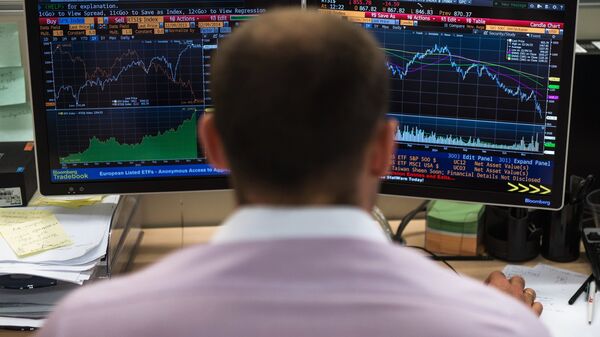Each year’s World Economic Forum looks strikingly different from last year’s event. You could notice the changes the minute you arrive at Davos Platz train station.
In 2019 you could have spotted Japan’s Prime Minister Shinzo Abe riding a train to Davos Platz. This time Abe and many other world leaders skipped WEF for various reasons. pic.twitter.com/IHSOrny5Az
— Denis Bolotsky (@BolotskySputnik) January 21, 2020
With one third from last year's number of world leaders in absentia, the Forum’s focus seems to have shifted somewhat from politics to economic trends, investments, and popular buzz words, such as AI.
AI and trade wars were discussed by panelists at “East Tech West” – a preview of CNBC’s annual tech retreat. Russian Direct Investment Fund’s CEO Kirill Dmitriev is one of studio guests. pic.twitter.com/tVtxaWa0mE
— Denis Bolotsky (@BolotskySputnik) January 21, 2020
According to Kirill Dmitriev, Russia has a positive track record of implementing artificial intelligence in various industries, such as tax collection and health care, and the importance of this technology may grow in the future, as the country's new prime minister is an active proponent of digitalization:
“We just mentioned that the Russian government is focused on AI development very significantly. Our new Prime Minister Mishustin implemented lots of AI algorithms in tax collection in Russia.” – Dmitriev told Sputnik in an interview – “So I think that gives very important experience and very important precedent to drive AI to many other industries in Russia. We believe that AI brings 20-30% in efficiency to many industries. And Russia is in a unique position – it has talented mathematicians, talented programmers who are able to apply AI in many industries."
Despite the busy forum schedule, the Russian delegation in Davos seems to have been following the developments in Moscow, so when the news about the appointment of the new cabinet came, Kirill Dmitriev shared with the media his views on the new government’s priorities:
“The new government will become the cabinet of the economic breakthrough, and will be focusing, undoubtedly, on growth, attracting additional investments and increasing the pace of implementation of national projects – the tasks which were outlined by the President in his Federal Assembly address. We think that these measures will increase Russia’s economic growth rate from 2% to 3% in 2021."
RDIF has been bringing up the subject of priority projects on many occasions last year – at the St.Petersburg economic Forum in the summer, and during BRICS summit in Brasilia in the autumn. Key RDIF proposal is to increase the share of “private money” in these projects up to 30%
— Denis Bolotsky (@BolotskySputnik) January 21, 2020
National priority projects are initiatives focusing on Russia’s human capital, economic growth and the improvement of living conditions. They were first proposed by President Putin in 2005 and went through a major update last year.
According to the RDIF CEO, 2019 was a good year in terms of attracting foreign investments and national projects will remain on the fund’s agenda in 2020:
“Definitely, we are focused on attracting private investments into many national projects. We believe there is an opportunity to do so. Foreign investment in Russia grew by two times last year. And we believe that in infrastructure, and many other areas there is a pool of investors, who are partners of the RDIF, who would like to continue investing, and we will work with them to do so."
RDIF is Russia’s sovereign wealth fund, established to make equity co-investments, primarily in Russia, alongside international strategic and financial investors. Since 2011, it has successfully implemented more than 80 projects totalling more than 1.7 trillion rubles.



